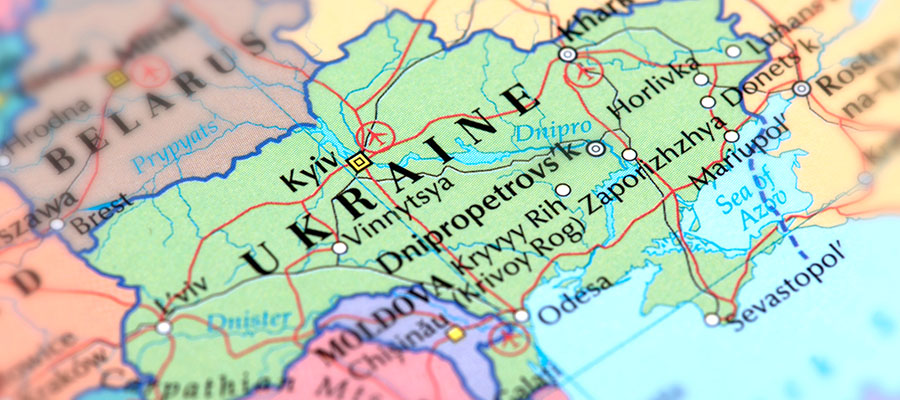Geopolitical risks arise when countries’ interests collide, from trade tensions to climate change policy conflict and, as we are seeing right now, military conflict. These events generate uncertainty in economies and financial markets, and investors must pay close attention. So here is our summary of how the situation in Ukraine is impacting markets.
What is happening?
Since late 2021, Russia has been deploying its military close to Ukraine’s borders. However, President Vladimir Putin denied an attack was imminent. Russia has long opposed Ukraine’s move towards the European Union and the North Atlantic Treaty Organisation (NATO), seeing it as a major security threat as NATO’s reach moved ever closer to Russia’s border.
On 24 February, the world witnessed one of the largest military deployments in Europe since WWII, when Putin declared a ‘special military operation’ in Ukraine.
However, this isn’t the first time Russia has invaded Ukraine. In 2014, Russia deployed its military in Ukraine and occupied the Crimean Peninsula and supported a rebellion led by pro-Russian separatists in the eastern Donbas region. Putin appears intent on bringing Ukraine, a nation of around 44 million, back into Russia’s control.
Equity markets are seeing heightened volatility, but selloff may be short-lived
Whenever we see global events of this magnitude, there is an increased likelihood of volatility. However, much of this stems from uncertainty and downside risks rather than the actual event itself.
While geopolitical events tend to cause selloffs in equity markets, they are generally short-lived, with the macroeconomic context eventually dominating the direction of equity markets.
Research into previous geopolitical events by global strategists from Deutsche Bank, Binky Chadha and ParagThatte demonstrates this. The study found that major geopolitical events caused an average market decline of -5.7%; it took an average of three weeks for the market to reach the bottom and a further three weeks for the market to recover; and on average, the market was 13% higher from the bottom 12 months after the event.
There were three significant exceptions in the study, the Israel Arab War (1973), the impeachment of President Nixon (1974) and the 9/11 attacks (2001), where the S&P 500 recorded negative returns driven by the macroeconomic environment, with all three events occurring during economic recessions.
Economic impact will likely be limited
The global impact of the conflict will depend on duration and scale and the severity of Western sanctions placed on Russia. However, the global economic impact of the current conflict is expected to be limited, with the direct effect contained to Russia and Europe.
Russia accounts for approximately 10% of global oil production and around 19% of global gas production. In addition, other commodities that Russia is a major producer of, such as palladium, nickel, aluminium and wheat, will also be affected.
If the energy supply from Russia is disrupted, oil and gas prices will increase inflationary pressures. This occurrence would add to the scenario for Central Banks to tighten monetary policy and Europe’s energy crisis, as it imports around 40% of its oil and gas from Russia.
What should investors do?
As with any emerging situation, it’s critical to stay abreast of market movements without making panicked moves. If you are an Apt client, you can rest assured that your adviser is working closely with our in-house Investment Team, accessing the latest global research to make recommendations contextualised to your circumstances.
In addition, you should receive our weekly market updates on Friday afternoons that keep you informed. You can also access these publicly via our LinkedIn and Facebook pages.
General Advice warning
The information provided in this blog does not constitute financial product advice. The information is of a general nature only and does not take into account your individual objectives, financial situation or needs. It should not be used, relied upon, or treated as a substitute for specific professional advice. Apt Wealth Partners (AFSL and ACL 436121 ABN 49 159 583 847) and Apt Wealth Home Loans (powered by Smartline ACL 385325) recommends that you obtain professional advice before making any decision in relation to your particular requirements or circumstances.


